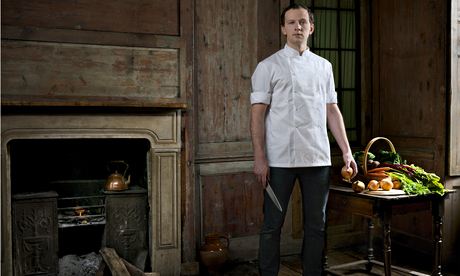
I didn't start cooking until I was 23, so I've always felt I was behind other chefs. After university I wanted to be a pilot: I went for an interview with British Airways, but it was not long after 9/11 and they said they would restart the scholarship in 12 months. I didn't have any money, so I took a job as a waiter at the Wapping Project in east London. I got on really well with the guys in the kitchen and I really respected the fact they were very focused and driven. It wasn't an in-the-meantime thing for them; it was their life.
One day, the head chef came back from a stag do at the Fat Duck and brought the menu. Crab ice-cream! I remember thinking, "Oh my God! Who is this guy?" I booked a table and a few days later I went to eat at St John. They are very different restaurants but you could tell both Heston Blumenthal and Fergus Henderson had a really clear idea what they wanted to do and they stuck to their guns.
I started going to two or three restaurants a week, spending cash I didn't really have. At the Capital in Knightsbridge I was looked up and down by a French waiter and told: "You're not dressed right. We're going to have to put you on a table in the corner." I thought: "This is so wrong. It shouldn't be like this."
In my head I came up with a plan: I'd work at La Trompette in Chiswick to learn French cooking, go to the Fat Duck and then on to St John. After that, I'd open my own restaurant. I was 23, so I wanted to do that by 30.
That's pretty much what I did, although it's taken longer than planned. Before I opened Lyle's in April, I'd been looking for a site for almost three years. The last year was awful, because people would keep coming up and saying: "Is it happening?" You'd feel an idiot because you would be really excited and then lose the site. I started struggling and thinking: "I've left this too late; I've blown it. I haven't got the energy to open a restaurant." But ever since I got in the kitchen at Lyle's, I've not felt tired at all. Someone said to me: "I bet you won't be happy when you start working 90-hour weeks again." But I've been waiting three years to get back in the kitchen. I lost my passport recently and I thought: "It doesn't matter, there's no point getting another one at the moment."
Among my contemporaries, there is mild competition, but it's not serious. When I did a pop-up at the Ten Bells in Shoreditch in 2011 with Isaac McHale, before he opened the Clove Club, there would be banter about who would get their place first. But people are genuinely encouraging of others: there are so many styles of places to eat now and they are all valid. The best food isn't at Michelin-starred restaurants any more – fact, it's not.
I still really like the restaurants that inspired me to start cooking: the Fat Duck, St John. I haven't jumped from trend to trend: "Oh, I love these molecular restaurants … now I want to open a foraging restaurant."
The fundamentals of restaurants are that you should be looked after and not feel intimidated; you should be served good food cooked thoughtfully, bought from nice people and not be charged too much. I've realised I prefer looking after people to cooking for them. I love cooking, but I love restaurants more – it's the whole package.

